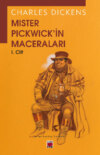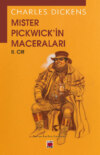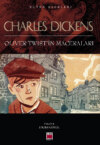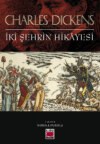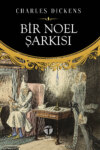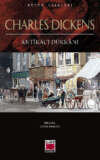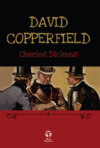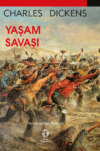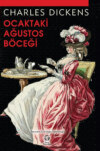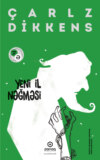Kitabı oku: «The Cricket on the Hearth: A Fairy Tale of Home», sayfa 3
Happy Blind Girl! How merry she was, in her exultation!
"I see you, father," she said, clasping her hands, "as plainly, as if I had the eyes I never want when you are with me. A blue coat" —
"Bright blue," said Caleb.
"Yes, yes! Bright blue!" exclaimed the girl, turning up her radiant face; "the colour I can just remember in the blessed sky! You told me it was blue before! A bright blue coat" —
"Made loose to the figure," suggested Caleb.
"Yes! loose to the figure!" cried the Blind Girl, laughing heartily; "and in it you, dear father, with your merry eye, your smiling face, your free step, and your dark hair: looking so young and handsome!"
"Halloa! Halloa!" said Caleb. "I shall be vain, presently."
"I think you are, already," cried the Blind Girl, pointing at him, in her glee. "I know you father! Ha ha ha! I've found you out, you see!"
How different the picture in her mind, from Caleb, as he sat observing her! She had spoken of his free step. She was right in that. For years and years, he never once had crossed that threshold at his own slow pace, but with a footfall counterfeited for her ear; and never had he, when his heart was heaviest, forgotten the light tread that was to render hers so cheerful and courageous!
Heaven knows! But I think Caleb's vague bewilderment of manner may have half originated in his having confused himself about himself and everything around him, for the love of his Blind Daughter. How could the little man be otherwise than bewildered, after labouring for so many years to destroy his own identity, and that of all the objects that had any bearing on it!
"There we are," said Caleb, falling back a pace or two to form the better judgment of his work; "as near the real thing as sixpenn'orth of halfpence is to sixpence. What a pity that the whole front of the house opens at once! If there was only a staircase in it now, and regular doors to the rooms to go in at! But that's the worst of my calling, I'm always deluding myself, and swindling myself."
"You are speaking quite softly. You are not tired father?"
"Tired," echoed Caleb, with a great burst of animation, "what should tire me, Bertha? I was never tired. What does it mean?"
To give the greater force to his words, he checked himself in an involuntary imitation of two half length stretching and yawning figures on the mantel-shelf, who were represented as in one eternal state of weariness from the waist upwards; and hummed a fragment of a song. It was a Bacchanalian song, something about a Sparkling Bowl; and he sang it with an assumption of a Devil-may-care voice, that made his face a thousand times more meagre and more thoughtful than ever.
"What! you're singing, are you?" said Tackleton, putting his head in, at the door. "Go it! I can't sing."
Nobody would have suspected him of it. He hadn't what is generally termed a singing face, by any means.
"I can't afford to sing," said Tackleton. "I'm glad you can. I hope you can afford to work too. Hardly time for both, I should think?"
"If you could only see him, Bertha, how he's winking at me!" whispered Caleb. "Such a man to joke! you'd think, if you didn't know him, he was in earnest – wouldn't you now?"
The Blind Girl smiled, and nodded.
"The bird that can sing and won't sing, must be made to sing, they say," grumbled Tackleton. "What about the owl that can't sing, and oughtn't to sing, and will sing; is there anything that he should be made to do?"
"The extent to which he's winking at this moment!" whispered Caleb to his daughter. "Oh, my gracious!"
"Always merry and light-hearted with us!" cried the smiling Bertha.
"Oh! you're there, are you?" answered Tackleton. "Poor Idiot!"
He really did believe she was an Idiot; and he founded the belief, I can't say whether consciously or not, upon her being fond of him.
"Well! and being there, – how are you?" said Tackleton; in his grudging way.
"Oh! well; quite well. And as happy as even you can wish me to be. As happy as you would make the whole world, if you could!"
"Poor Idiot!" muttered Tackleton. "No gleam of reason. Not a gleam!"
The Blind Girl took his hand and kissed it; held it for a moment in her own two hands; and laid her cheek against it tenderly, before releasing it. There was such unspeakable affection and such fervent gratitude in the act, that Tackleton himself was moved to say, in a milder growl than usual:
"What's the matter now?"
"I stood it close beside my pillow when I went to sleep last night, and remembered it in my dreams. And when the day broke, and the glorious red sun – the red sun, father?"
"Red in the mornings and the evenings, Bertha," said poor Caleb, with a woeful glance at his employer.
"When it rose, and the bright light I almost fear to strike myself against in walking, came into the room, I turned the little tree towards it, and blessed Heaven for making things so precious, and blessed you for sending them to cheer me!"
"Bedlam broke loose!" said Tackleton under his breath. "We shall arrive at the strait-waistcoat and mufflers soon. We're getting on!"
Caleb, with his hands hooked loosely in each other, stared vacantly before him while his daughter spoke, as if he really were uncertain (I believe he was) whether Tackleton had done anything to deserve her thanks, or not. If he could have been a perfectly free agent, at that moment, required, on pain of death, to kick the Toy merchant, or fall at his feet, according to his merits, I believe it would have been an even chance which course he would have taken. Yet Caleb knew that with his own hands he had brought the little rose tree home for her, so carefully; and that with his own lips he had forged the innocent deception which should help to keep her from suspecting how much, how very much, he every day denied himself, that she might be the happier.
"Bertha!" said Tackleton, assuming, for the nonce, a little cordiality. "Come here."
"Oh! I can come straight to you! You needn't guide me!" she rejoined.
"Shall I tell you a secret, Bertha?"
"If you will!" she answered, eagerly.
How bright the darkened face! How adorned with light, the listening head!
"This is the day on which little what's-her-name; the spoilt child; Peerybingle's wife; pays her regular visit to you – makes her fantastic Pic-Nic here; an't it?" said Tackleton, with a strong expression of distaste for the whole concern.
"Yes," replied Bertha. "This is the day."
"I thought so!" said Tackleton. "I should like to join the party."
"Do you hear that, father!" cried the Blind Girl in an ecstacy.
"Yes, yes, I hear it," murmured Caleb, with the fixed look of a sleep-walker; "but I don't believe it. It's one of my lies, I've no doubt."
"You see I – I want to bring the Peerybingles a little more into company with May Fielding," said Tackleton. "I am going to be married to May."
"Married!" cried the Blind Girl, starting from him.
"She's such a con-founded idiot," muttered Tackleton, "that I was afraid she'd never comprehend me. Ah, Bertha! Married! Church, parson, clerk, beadle, glass-coach, bells, breakfast, bride-cake, favours, marrow-bones, cleavers, and all the rest of the tom-foolery. A wedding, you know; a wedding. Don't you know what a wedding is?"
"I know," replied the Blind Girl, in a gentle tone. "I understand!"
"Do you?" muttered Tackleton. "It's more than I expected. Well! on that account I want to join the party, and to bring May and her mother. I'll send in a little something or other, before the afternoon. A cold leg of mutton, or some comfortable trifle of that sort. You'll expect me?"
"Yes," she answered.
She had drooped her head, and turned away; and so stood, with her hands crossed, musing.
"I don't think you will," muttered Tackleton, looking at her; "for you seem to have forgotten all about it, already. Caleb!"
"I may venture to say I'm here, I suppose," thought Caleb. "Sir!"
"Take care she don't forget what I've been saying to her."
"She never forgets," returned Caleb. "It's one of the few things she an't clever in."
"Every man thinks his own geese, swans," observed the Toy merchant, with a shrug. "Poor devil!"
Having delivered himself of which remark, with infinite contempt, old Gruff and Tackleton withdrew.
Bertha remained where he had left her, lost in meditation. The gaiety had vanished from her downcast face, and it was very sad. Three or four times, she shook her head, as if bewailing some remembrance or some loss; but her sorrowful reflections found no vent in words.
It was not until Caleb had been occupied, some time, in yoking a team of horses to a waggon by the summary process of nailing the harness to the vital parts of their bodies, that she drew near to his working-stool, and sitting down beside him, said:
"Father, I am lonely in the dark. I want my eyes: my patient, willing eyes."
"Here they are," said Caleb. "Always ready. They are more your's than mine, Bertha, any hour in the four and twenty. What shall your eyes do for you, dear?"
"Look round the room, father."
"All right," said Caleb. "No sooner said than done, Bertha."
"Tell me about it."
"It's much the same as usual," said Caleb. "Homely, but very snug. The gay colors on the walls; the bright flowers on the plates and dishes; the shining wood, where there are beams or panels; the general cheerfulness and neatness of the building; make it very pretty."
Cheerful and neat it was, wherever Bertha's hands could busy themselves. But nowhere else, were cheerfulness and neatness possible, in the old crazy shed which Caleb's fancy so transformed.
"You have your working dress on, and are not so gallant as when you wear the handsome coat?" said Bertha, touching him.
"Not quite so gallant," answered Caleb. "Pretty brisk though."
"Father," said the Blind Girl, drawing close to his side, and stealing one arm round his neck "Tell me something about May. She is very fair?"
"She is indeed," said Caleb. And she was indeed. It was quite a rare thing to Caleb, not to have to draw on his invention.
"Her hair is dark," said Bertha, pensively, "darker than mine. Her voice is sweet and musical, I know. I have often loved to hear it. Her shape – "
"There's not a Doll's in all the room to equal it," said Caleb. "And her eyes!" —
He stopped; for Bertha had drawn closer round his neck; and, from the arm that clung about him, came a warning pressure which he understood too well.
He coughed a moment, hammered for a moment, and then fell back upon the song about the Sparkling Bowl; his infallible resource in all such difficulties.
"Our friend, father; our benefactor. I am never tired you know of hearing about him. – Now was I, ever?" she said, hastily.
"Of course not," answered Caleb. "And with reason."
"Ah! With how much reason!" cried the Blind Girl. With such fervency, that Caleb, though his motives were so pure, could not endure to meet her face; but dropped his eyes, as if she could have read in them his innocent deceit.
"Then, tell me again about him, dear father," said Bertha. "Many times again! His face is benevolent, kind, and tender. Honest and true, I am sure it is. The manly heart that tries to cloak all favours with a show of roughness and unwillingness, beats in its every look and glance."
"And makes it noble," added Caleb in his quiet desperation.
"And makes it noble!" cried the Blind Girl. "He is older than May, father."
"Ye-es," said Caleb, reluctantly. "He's a little older than May. But that don't signify."
"Oh father, yes! To be his patient companion in infirmity and age; to be his gentle nurse in sickness, and his constant friend in suffering and sorrow; to know no weariness in working for his sake; to watch him, tend him; sit beside his bed, and talk to him, awake; and pray for him asleep; what privileges these would be! What opportunities for proving all her truth and her devotion to him! Would she do all this, dear father?"
"No doubt of it," said Caleb.
"I love her, father; I can love her from my soul!" exclaimed the Blind Girl. And saying so, she laid her poor blind face on Caleb's shoulder, and so wept and wept, that he was almost sorry to have brought that tearful happiness upon her.
In the mean time, there had been a pretty sharp commotion at John Peerybingle's; for little Mrs. Peerybingle naturally couldn't think of going anywhere without the Baby; and to get the Baby under weigh, took time. Not that there was much of the Baby: speaking of it as a thing of weight and measure: but there was a vast deal to do about and about it, and it all had to be done by easy stages. For instance: when the Baby was got, by hook and by crook, to a certain point of dressing, and you might have rationally supposed that another touch or two would finish him off, and turn him out a tip-top Baby, challenging the world, he was unexpectedly extinguished in a flannel cap, and hustled off to bed; where he simmered (so to speak) between two blankets for the best part of an hour. From this state of inaction he was then recalled, shining very much and roaring violently, to partake of – well! I would rather say, if you'll permit me to speak generally – of a slight repast. After which, he went to sleep again. Mrs. Peerybingle took advantage of this interval, to make herself as smart in a small way as ever you saw anybody in all your life; and during the same short truce, Miss Slowboy insinuated herself into a spencer of a fashion so surprising and ingenious, that it had no connection with herself or anything else in the universe, but was a shrunken, dog's-eared, independent fact, pursuing its lonely course without the least regard to anybody. By this time, the Baby, being all alive again, was invested, by the united efforts of Mrs. Peerybingle and Miss Slowboy, with a cream-coloured mantle for its body, and a sort of nankeen raised-pie for its head; and so in course of time they all three got down to the door, where the old horse had already taken more than the full value of his day's toll out of the Turnpike Trust, by tearing up the road with his impatient autographs – and whence Boxer might be dimly seen in the remote perspective, standing looking back, and tempting him to come on without orders.
As to a chair, or anything of that kind for helping Mrs. Peerybingle into the cart, you know very little of John, I flatter myself, if you think that was necessary. Before you could have seen him lift her from the ground, there she was in her place, fresh and rosy, saying, "John! How can you! Think of Tilly!"
If I might be allowed to mention a young lady's legs, on any terms, I would observe of Miss Slowboy's that there was a fatality about them which rendered them singularly liable to be grazed; and that she never effected the smallest ascent or descent, without recording the circumstance upon them with a notch, as Robinson Crusoe marked the days upon his wooden calendar. But as this might be considered ungenteel, I'll think of it.
"John? You've got the basket with the Veal and Ham-Pie and things; and the bottles of Beer?" said Dot. "If you haven't, you must turn round again, this very minute."
"You're a nice little article," returned the Carrier, "to be talking about turning round, after keeping me a full quarter of an hour behind my time."
"I am sorry for it, John," said Dot in a great bustle, "but I really could not think of going to Bertha's – I wouldn't do it, John, on any account – without the Veal and Ham-Pie and things, and the bottles of Beer. Way!"
This monosyllable was addressed to the Horse, who didn't mind it at all.
"Oh do Way, John!" said Mrs. Peerybingle. "Please!"
"It'll be time enough to do that," returned John, "when I begin to leave things behind me. The basket's here, safe enough."
"What a hard-hearted monster you must be, John, not to have said so, at once, and saved me such a turn! I declare I wouldn't go to Bertha's without the Veal and Ham-Pie and things, and the bottles of Beer, for any money. Regularly once a fortnight ever since we have been married, John, have we made our little Pic-Nic there. If anything was to go wrong with it, I should almost think we were never to be lucky again."
"It was a kind thought in the first instance," said the Carrier; "and I honour you for it, little woman."
"My dear John," replied Dot, turning very red. "Don't talk about honouring me. Good Gracious!"
"By the bye – " observed the Carrier. "That old gentleman," —
Again so visibly, and instantly embarrassed.
"He's an odd fish," said the Carrier, looking straight along the road before them. "I can't make him out. I don't believe there's any harm in him."
"None at all. I'm – I'm sure there's none at all."
"Yes?" said the Carrier, with his eyes attracted to her face by the great earnestness of her manner. "I am glad you feel so certain of it, because it's a confirmation to me. It's curious that he should have taken it into his head to ask leave to go on lodging with us; an't it? Things come about so strangely."
"So very strangely," she rejoined in a low voice: scarcely audible.
"However, he's a good-natured old gentleman," said John, "and pays as a gentleman, and I think his word is to be relied upon, like a gentleman's. I had quite a long talk with him this morning: he can hear me better already, he says, as he gets more used to my voice. He told me a great deal about himself, and I told him a good deal about myself, and a rare lot of questions he asked me. I gave him information about my having two beats, you know, in my business; one day to the right from our house and back again; another day to the left from our house and back again (for he's a stranger and don't know the names of places about here); and he seemed quite pleased. 'Why, then I shall be returning home to-night your way,' he says, 'when I thought you'd be coming in an exactly opposite direction. That's capital. I may trouble you for another lift perhaps, but I'll engage not to fall so sound asleep again.' He was sound asleep, sure-ly! – Dot! what are you thinking of?"
"Thinking of, John? I – I was listening to you."
"Oh! That's all right!" said the honest Carrier. "I was afraid, from the look of your face, that I had gone rambling on so long, as to set you thinking about something else. I was very near it, I'll be bound."
Dot making no reply, they jogged on, for some little time, in silence. But it was not easy to remain silent very long in John Peerybingle's cart, for everybody on the road had something to say; and though it might only be "How are you!" and indeed it was very often nothing else, still, to give that back again in the right spirit of cordiality, required, not merely a nod and a smile, but as wholesome an action of the lungs withal, as a long-winded Parliamentary speech. Sometimes, passengers on foot, or horseback, plodded on a little way beside the cart, for the express purpose of having a chat; and then there was a great deal to be said, on both sides.
Then, Boxer gave occasion to more good-natured recognitions of and by the Carrier, than half a dozen Christians could have done! Everybody knew him, all along the road, especially the fowls and pigs, who when they saw him approaching, with his body all on one side, and his ears pricked up inquisitively, and that knob of a tail making the most of itself in the air, immediately withdrew into remote back settlements, without waiting for the honor of a nearer acquaintance. He had business everywhere; going down all the turnings, looking into all the wells, bolting in and out of all the cottages, dashing into the midst of all the Dame-Schools, fluttering all the pigeons, magnifying the tails of all the cats, and trotting into the public houses like a regular customer. Wherever he went, somebody or other might have been heard to cry, "Halloa! Here's Boxer!"
and out came that somebody forthwith, accompanied by at least two or three other somebodies, to give John Peerybingle and his pretty wife, Good Day.
The packages and parcels for the errand cart, were numerous; and there were many stoppages to take them in and give them out; which were not by any means the worst parts of the journey. Some people were so full of expectation about their parcels, and other people were so full of wonder about their parcels, and other people were so full of inexhaustible directions about their parcels, and John had such a lively interest in all the parcels, that it was as good as a play. Likewise, there were articles to carry, which required to be considered and discussed, and in reference to the adjustment and disposition of which, councils had to be holden by the Carrier and the senders: at which Boxer usually assisted, in short fits of the closest attention, and long fits of tearing round and round the assembled sages and barking himself hoarse. Of all these little incidents, Dot was the amused and open-eyed spectatress from her chair in the cart; and as she sat there, looking on: a charming little portrait framed to admiration by the tilt: there was no lack of nudgings and glancings and whisperings and envyings among the younger men, I promise you. And this delighted John the Carrier, beyond measure; for he was proud to have his little wife admired; knowing that she didn't mind it – that, if anything, she rather liked it perhaps.
The trip was a little foggy, to be sure, in the January weather; and was raw and cold. But who cared for such trifles? Not Dot, decidedly. Not Tilly Slowboy, for she deemed sitting in a cart, on any terms, to be the highest point of human joys; the crowning circumstance of earthly hopes. Not the Baby, I'll be sworn; for it's not in Baby nature to be warmer or more sound asleep, though its capacity is great in both respects, than that blessed young Peerybingle was, all the way.
You couldn't see very far in the fog, of course; but you could see a great deal, oh a great deal! It's astonishing how much you may see, in a thicker fog than that, if you will only take the trouble to look for it. Why, even to sit watching for the Fairy-rings in the fields, and for the patches of hoar-frost still lingering in the shade, near hedges and by trees, was a pleasant occupation: to make no mention of the unexpected shapes in which the trees themselves came starting out of the mist, and glided into it again. The hedges were tangled and bare, and waved a multitude of blighted garlands in the wind; but there was no discouragement in this. It was agreeable to contemplate; for it made the fireside warmer in possession, and the summer greener in expectancy. The river looked chilly; but it was in motion, and moving at a good pace; which was a great point. The canal was rather slow and torpid; that must be admitted. Never mind. It would freeze the sooner when the frost set fairly in, and then there would be skating, and sliding; and the heavy old barges, frozen up somewhere, near a wharf, would smoke their rusty iron chimney-pipes all day, and have a lazy time of it.
In one place, there was a great mound of weeds or stubble burning; and they watched the fire, so white in the day time, flaring through the fog, with only here and there a dash of red in it, until, in consequence as she observed of the smoke "getting up her nose," Miss Slowboy choked – she could do anything of that sort, on the smallest provocation – and woke the Baby, who wouldn't go to sleep again. But Boxer, who was in advance some quarter of a mile or so, had already passed the outposts of the town, and gained the corner of the street where Caleb and his daughter lived; and long before they reached the door, he and the Blind Girl were on the pavement waiting to receive them.
Boxer, by the way, made certain delicate distinctions of his own, in his communication with Bertha, which persuade me fully that he knew her to be blind. He never sought to attract her attention by looking at her, as he often did with other people, but touched her, invariably. What experience he could ever have had of blind people or blind dogs, I don't know. He had never lived with a blind master; nor had Mr. Boxer the elder, nor Mrs. Boxer, nor any of his respectable family on either side, ever been visited with blindness, that I am aware of. He may have found it out for himself, perhaps, but he had got hold of it somehow; and therefore he had hold of Bertha too, by the skirt, and kept hold, until Mrs. Peerybingle and the Baby, and Miss Slowboy, and the basket, were all got safely within doors.
May Fielding was already come; and so was her mother – a little querulous chip of an old lady with a peevish face, who, in right of having preserved a waist like a bedpost, was supposed to be a most transcendant figure; and who, in consequence of having once been better off, or of labouring under an impression that she might have been, if something had happened which never did happen, and seemed to have never been particularly likely to come to pass – but it's all the same – was very genteel and patronising indeed. Gruff and Tackleton was also there, doing the agreeable; with the evident sensation of being as perfectly at home, and as unquestionably in his own element, as a fresh young salmon on the top of the Great Pyramid.
"May! My dear old friend!" cried Dot, running up to meet her. "What a happiness to see you!"
Her old friend was, to the full, as hearty and as glad as she; and it really was, if you'll believe me, quite a pleasant sight to see them embrace. Tackleton was a man of taste, beyond all question. May was very pretty.
You know sometimes, when you are used to a pretty face, how, when it comes into contact and comparison with another pretty face, it seems for the moment to be homely and faded, and hardly to deserve the high opinion you have had of it. Now, this was not at all the case, either with Dot or May; for May's face set off Dot's, and Dot's face set off May's, so naturally and agreeably, that, as John Peerybingle was very near saying when he came into the room, they ought to have been born sisters: which was the only improvement you could have suggested.
Tackleton had brought his leg of mutton, and, wonderful to relate, a tart besides – but we don't mind a little dissipation when our brides are in the case; we don't get married every day – and in addition to these dainties, there were the Veal and Ham-Pie, and "things," as Mrs. Peerybingle called them; which were chiefly nuts and oranges, and cakes, and such small deer. When the repast was set forth on the board, flanked by Caleb's contribution, which was a great wooden bowl of smoking potatoes (he was prohibited, by solemn compact, from producing any other viands), Tackleton led his intended mother-in-law to the Post of Honour. For the better gracing of this place at the high Festival, the majestic old Soul had adorned herself with a cap, calculated to inspire the thoughtless with sentiments of awe. She also wore her gloves. But let us be genteel, or die!
Caleb sat next his daughter; Dot and her old schoolfellow were side by side; the good Carrier took care of the bottom of the table. Miss Slowboy was isolated, for the time being, from every article of furniture but the chair she sat on, that she might have nothing else to knock the Baby's head against.
As Tilly stared about her at the Dolls and Toys, they stared at her and at the company. The venerable old gentlemen at the street doors (who were all in full action) showed especial interest in the party: pausing occasionally before leaping, as if they were listening to the conversation: and then plunging wildly over and over, a great many times, without halting for breath, – as in a frantic state of delight with the whole proceedings.
Certainly, if these old gentlemen were inclined to have a fiendish joy in the contemplation of Tackleton's discomfiture, they had good reason to be satisfied. Tackleton couldn't get on at all; and the more cheerful his intended Bride became in Dot's society, the less he liked it, though he had brought them together for that purpose. For he was a regular Dog in the Manger, was Tackleton; and when they laughed, and he couldn't, he took it into his head, immediately, that they must be laughing at him.
"Ah May!" said Dot. "Dear dear, what changes! To talk of those merry school-days makes one young again."
"Why, you an't particularly old, at any time; are you?" said Tackleton.
"Look at my sober, plodding husband there," returned Dot. "He adds Twenty years to my age at least. Don't you John?"
"Forty," John replied.
"How many you'll add to May's, I am sure I don't know," said Dot, laughing. "But she can't be much less than a hundred years of age on her next birthday."
"Ha ha!" laughed Tackleton. Hollow as a drum, that laugh though. And he looked as if he could have twisted Dot's neck: comfortably.
"Dear dear!" said Dot. "Only to remember how we used to talk, at school, about the husbands we would choose. I don't know how young, and how handsome, and how gay, and how lively, mine was not to be! and as to May's! – Ah dear! I don't know whether to laugh or cry, when I think what silly girls we were."
May seemed to know which to do; for the color flashed into her face, and tears stood in her eyes.
"Even the very persons themselves – real live young men – we fixed on sometimes," said Dot. "We little thought how things would come about. I never fixed on John I'm sure; I never so much as thought of him. And if I had told you, you were ever to be married to Mr. Tackleton, why you'd have slapped me. Wouldn't you, May?"
Though May didn't say yes, she certainly didn't say no, or express no, by any means.
Tackleton laughed – quite shouted, he laughed so loud. John Peerybingle laughed too, in his ordinary good-natured and contented manner; but his was a mere whisper of a laugh, to Tackleton's.
"You couldn't help yourselves, for all that. You couldn't resist us, you see," said Tackleton. "Here we are! Here we are! Where are your gay young bridegrooms now!"
"Some of them are dead," said Dot; "and some of them forgotten. Some of them, if they could stand among us at this moment, would not believe we were the same creatures; would not believe that what they saw and heard was real, and we could forget them so. No! they would not believe one word of it!"











